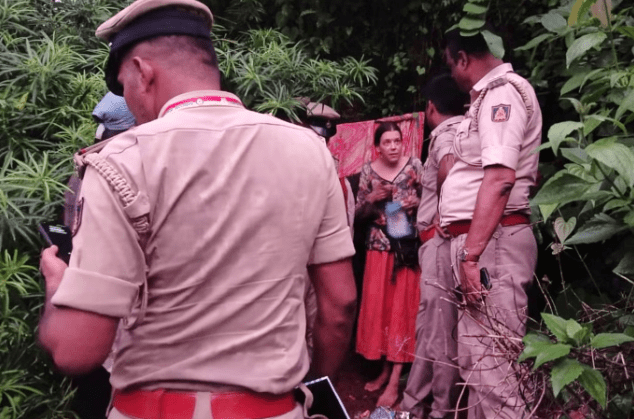In a remote, rain-drenched forest in southern India, a Russian family found in a cave has sparked headlines worldwide — not for crime or scandal, but for the unusual life they chose to lead.
Earlier this month, Indian forest patrol officers made a surprising discovery in the jungles of Karnataka’s Ramteertha Hills. Behind a cloth-draped entrance in the wilderness, they found 40-year-old Russian woman Nina Kutina living in a cave with her two young daughters, aged five and six.
No electricity. No school. No documents. But according to Kutina, no regrets either.
Russian Family Found in Cave in India: Why One Mother Chose Nature Over Society
Living undocumented in the Indian jungle, Nina Kutina claims the cave gave her daughters health, happiness, and freedom. But officials say it’s a visa violation, not an adventure.
Kutina’s hidden dwelling was discovered on 9 July during intensified patrols in the Gokarna forest, bordering the popular tourist state of Goa. Officials were monitoring landslide-prone zones when they spotted a barefoot blonde girl emerging from what looked like a cloth-covered hole in the hill.
Inside, they found her mother and younger sister — living off basic supplies, surrounded by clay art, colourful saris, and candlelight.
Kutina and her daughters had been staying in the cave for more than a week. Officer Sridhar SR described the mother as calm, yet hesitant to leave.
“It is nothing but her love for adventure that brought her here,” he said.
The Russian woman fiercely defended her choice to live off-grid, rejecting claims of endangerment.
“We were not dying, and I did not bring my children, my daughters, to die in the jungle… They swam in a waterfall, they lived, had very good place for sleeping… we made from clay, we painted, we ate good,” she told the ANI news agency.
She added that they weren’t far from civilisation — just a short walk to a nearby village for groceries and gas to cook meals.
“It’s very big and beautiful cave, and not small, and it’s like it has a window to look out to the ocean.”
Originally from Russia, Kutina claims she hasn’t lived there for 15 years. She has travelled widely — Costa Rica, Thailand, Ukraine, Nepal — and says she is a trained tutor in art and Russian literature.
Her elder son lives in Russia, and another son tragically died in Goa last year. The two daughters she lived with in the cave were fathered by Israeli businessman Dror Goldstein, who now seeks joint custody. He told NDTV that she vanished with the children, leading him to file a missing persons complaint.
#GokarnaPolice of #uttarakannada found a #Russianwoman #Nina_Kutina and her daughters aged #6and4years living in a #cave in a forest, Her #Visa had expired way back in 2017 and was #overstaying. She has been referred to #FRROfor deportation.#pramod #gokarna pic.twitter.com/XsF2U8CxqB
— Pramod (@pramodankolaVK) July 12, 2025
Indian officials are preparing to deport Kutina and her daughters. For now, they remain in a detention centre near Bengaluru.
Kutina has condemned the authorities for removing her from what she called a peaceful, natural life.
“And we were placed in a prison without sky, without grass, without a waterfall… Not once in our entire life there did a snake ever harm us… For many years, the only thing we feared was people.”
She expressed frustration with systems that, she said, rely on fear and ignorance instead of understanding and lived experience.
“I’m hurt by the world of humans – where people with no proper education are given positions that give them power over the lives of others – whole families, even.”
Their days were filled with art, reading, and time in the wild. Videos shared by police show the girls smiling in bright Indian outfits. Kutina said they were well-fed, content, and always safe.
The cave contained mats, a few clothes, cooking gas, noodles, and a Hindu idol — Panduranga Vittala — though she insisted this wasn’t about a spiritual retreat.
“It’s not about spiritually… we just like natural because it gives us health….” She claims to earn income through art and tutoring, and is supported financially by family when needed. Kutina also plans to homeschool her daughters, saying formal education isn’t the only path to learning.
Authorities are still unclear about how Kutina re-entered India. She arrived in 2016 on a business visa that expired in 2017. After being granted an exit permit in 2018, she travelled to Nepal — but returned to India months later.
“We don’t have a valid visa. Our visa has finished. I was so sad, I could not think about a visa,” she said, blaming her grief over her son’s death for the lapse. There is no current record confirming her re-entry, but reports suggest she’s been in India since at least 2020.
As India’s immigration authorities prepare for deportation, a custody dispute brews in the background. Goldstein, the children’s father, opposes their removal to Russia.
Meanwhile, Kutina remains unapologetic about her off-the-grid life, insisting it was a conscious, healthy choice.
The case of the Russian family found in a cave in India has sparked wider discussions about alternative lifestyles, legal systems, and the meaning of “safety” for a child.
One thing is clear — this was not a family lost in the wild. They were exactly where the mother wanted to be. Just not where the law said they should.






